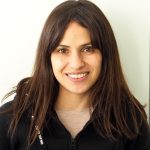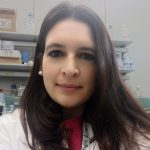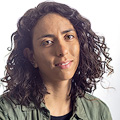Team

Martino Calamai
calamai@lens.unifi.it
After earning a bachelor’s degree in Biology in 2001 at the University of Florence, Martino Calamai worked as research assistant at the Department of Biochemical Sciences on protein folding and misfolding in collaboration with Prof. F. Chiti and Prof. M. Stefani. He then moved in 2002 to the lab of Prof. C. M. Dobson at the University of Cambridge for a doctorate in Chemistry funded through a Marie Curie Training Network, where he investigated the role of electrostatic interactions on amyloid aggregation and disaggregation by using biophysical, biomolecular and bioinformatic approaches. In 2006 he joined to the group of Prof. A. Triller at the Ecole Normale Supérieure of Paris for a 2-year post-doctorate in Neuroscience funded by FEBS to study the mechanisms through which neurotransmitter receptors are stabilised at the synapse. In 2009, he moved to the Biophysics Group of Prof. F. S. Pavone at LENS with a Marie Curie IEF fellowship funded by the European Commission to investigate the dynamics of amyloid oligomers in living cells with single molecule tracking methods. After a brief period as head of research unit within the Italian ministerial program FIRB-Futuro in Ricerca2010, in 2012 he obtained a position as a permanent researcher at the National Research Council (CNR), initially at the Neuroscience Institute and then at the National Institute of Optics. He has been recently involved as head of research unit in European (H2020 NMBP-2016-2017, H2020 MSCA ITN 2020) and national (Bando ricerca salute regione Toscana 2018) research projects. During 20 years of research he has gained multidisciplinary expertise in biophysics, molecular, structural and cell biology, microscopy, nanoscience, neuroscience and neurodegenerative diseases.

Claudia Capitini
Associate Researcher
capitini@lens.unifi.it
Claudia Capitini obtained her Master Degree in Medical and Pharmaceutical Biotechnology in April 2012 at the University of Florence (Italy), under the supervision of Fabrizio Chiti, presenting a thesis on the biophysical and biochemical characterization of bacterial inclusion bodies of human TAR DNA-binding Protein 43 (TDP-43). From October 2012 to December 2016 she worked as a Research Assistant through a contract with the University of Cambridge and the ELAN pharmaceutical company. At the same time, from November 2013, she was a PhD student in the Fabrizio Chiti’s group in Florence. During these years, she focused on the structural properties of the amyloid-like oligomeric intermediates formed by the bacterial HypF-N protein under different solution conditions, mainly using the Förster Resonance Energy Transfer (FRET) technique. From May 2017 to December 2022 she worked as post-doc at LENS in the Martino Calamai’s group. During these years, she has taken part in several projects, including the characterization of a potential therapeutic approach for the treatment of Multiple Sclerosis (N2B-patch project), the study of the effect of cholesterol on the processing and plasma membrane mobility of APP and Bace1, and the validation of new diagnostic tests for lysosomal storage diseases (LSDs) (LYSOLATE project). Recently, she has been funded by the foundation AIRALZH with a project aimed at studying the natural compound trodusquemine, focusing in particular on its potential effect as a therapeutic for Alzheimer’s disease.

Costanza Ceni
Associate Researcher
costanza.ceni@gmail.com
Costanza Ceni obtained her Master Degree in Pharmaceutical Chemistry and Technology in October 2018 at the University of Florence (Italy), under the supervision of Professor Vittoria Colotta, focusing on the design and synthesis of novel multitarget compounds with potential antioxidant and antitumoral action. Subsequently, from February to August 2019, she worked in the same research group with a post-graduated fellowship, aimed to identify novel A2A and A2B adenosine antagonists, potentially useful in wound healing and in the prevention of fibrosis. In October 2019, she won a Pegaso PhD fellowship at University of Siena (Italy), in collaboration with University of Pisa (Italy), under the supervision of Professor Marco Macchia, working on the synthesis and the pharmacological evaluation of novel endocannabinoid modulators potentially useful in neurodegenerative disorders. As part of PhD curse, she also spent six months at the University of Saskatchewan (Canada) as visiting research student, and three months in Toscana Life Sciences Foundation, Siena (Italy). Since February 2023, she is working as post-doc at LENS, in collaboration with the Department of Chemistry, aimed to test fluorinated pharmacological chaperones for Parkinson disease in drug-delivery studies.

Marta Rojas Rodríguez
Associate Researcher
rojas@lens.unifi.it
Marta Rojas Rodríguez obtained her Bachelor’s degree in Biology by the University of Seville and her Master of Science in Health Biotechnology by the University Pablo de Olavide, both located in Seville, Spain. Her master’s thesis was carried out at the Andalusian Centre for Developmental Biology (CABD) and titled: “The role of the conserved BAF protein in nuclear organization and development”. It was focused on the study of this protein using C. elegans as a model organism, in order to understand the function of proteins as BAF and its relation with human progeroid syndromes, as well as, to better comprehend the aging process. Her first international experience was in New Jersey, USA, for a few years of international exchange. In 2021 she won a research scholarship at the European Laboratory for Non-Linear Spectroscopy (LENS) in Florence, Italy, to work on the project “Organization of responsive materials for preparation of artificial muscle”, where she was working on liquid crystalline polymers. In November 2021 she became a MSCA PhD Candidate in the Bio2Brain network, where is currently working on the project “Nose-to-Brain Delivery of Biopharmaceutics for the Therapy of Central Nervous System Diseases”, under the mentorship of Dr. Martino Calamai.
Alumni

Alessia Nigro – grad student

Federica Serra – grad student

Federica Padula – grad student

Dimitri Papini – grad student

Carmen Carbone – postdoc

Alessia Tempestini – postdoc

Claudia Antoni – grad student

Marco Emanuele – undergrad student

Niccolò Bianchi – undergrad student

Alberto Gómez-Navarro – research assistant

Zoe Lombardi – grad student

William Loachamin – grad student

Niccolò Parenti – PhD student

Rachele Reggioli – undergrad student